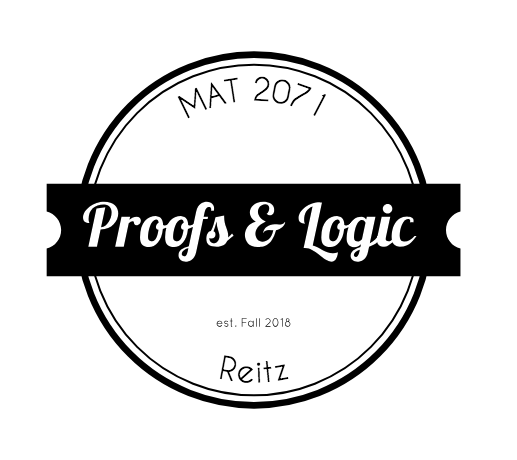Tag: OpenLab 8
Handy Links
 Logic on Math StackExchange
Logic on Math StackExchange
- Can the set of integers be constructed starting from Peano's Axioms without powersets? November 21, 2024I was able to formally construct the set of integers starting from Peano's Axioms using a powerset axiom among other ZF-like axioms (31 lines available here on request). Informally, I have: $\pm 0 = \{(0,~ 0),~ (1,~ 1),~ (2, 2), \cdots \}$ $+1 = \{(1,~ 0),~ (2,~ 1),~ (3, 2), \cdots \}$ $-1 = \{(0,~ […]Dan Christensen
- On the correct $(\forall)$-introduction rule in Natural Deduction November 21, 2024In a nutshell: is the following the $(\forall)$-introduction rule in Natural Deduction? $$\frac{\phi[t/x]}{\forall x\phi}\ \ \ \ \ \ \ \ \ \begin{matrix}\text{provided the term $t$ does not occur in $\phi$}\\ \text{nor in any undischarged assumption in the proof of $\phi[t/x]$}\end{matrix} $$ I began learning about natural deduction from these notes where the $(\forall)$-introduction rule […]Sam
- Proving $\vdash \phi(x,y,\ldots,z)$ if and only if $\vdash\forall x\forall y\cdots\forall z\phi(x,y,\ldots,z)$ using Natural Deduction November 21, 2024I suspect the following holds: $$\vdash \phi(x,y,\ldots,z)\iff \vdash\forall x\forall y\cdots\forall z\phi(x,y,\ldots,z)$$ where $\phi$ is a formula with free variables $x,y,\ldots, z$. Here is my argument using Natural Deduction : $(\Rightarrow):$ $\vdash\phi(x,y,\ldots,z)$ means $\vdash\phi(x',y',\ldots,z')$ for new variables $x',y',\ldots,z'$. Now we may use $\forall$-introduction: $$\frac{\dfrac{\phi(x',y',\ldots,z')}{\forall x\phi(x,y',\ldots,z')}}{\dfrac{\vdots}{\forall x\forall y\cdots\forall z \phi(x,y,\ldots,z)}}$$ $(\Leftarrow):$ using $\forall$-elimination repeatedly: $$\frac{\dfrac{\forall x\forall y\cdots\forall […]Sam
- Is it actually possible to prove difficult propositional theorems without using inference? [closed] November 20, 2024For the theorem $(\phi\to\psi) \to \bigl((\phi\to\xi) \to (\phi\to\psi\land\xi)\bigr),$ I can fairly easily derive any proof using Deduction Theorem, but our professor says that we are allowed to use only the Hilbert/Frege axioms and modus ponens, but not assumptions, conditions, inferences, truth tables or substitutions. Is it actually possible to prove difficult propositional theorems without using […]Whatevur m8
- Why are the ZFC -axioms written like that? [closed] November 20, 2024Question 1: Why is the Axiom of Extensionability written as: $$\forall x \forall y(\forall z(z\in x \iff z\in y) \rightarrow x=y)$$ Doesn't this read: for all $x$ and $y$, $x = y$ if for all $z$, $z$ is a member of $x$ if and only if $z$ is a member of $y$? Isn't this $$\forall […]DefinitelyNotADolphin
- Complete a natural deduction in FOL for this statement: ∃y∀xA(x,y) ⊢ ∀x∃yA(x,y) [closed] November 20, 2024I need help solving this FOL proof. I believe it needs to use change of quantifier rules, but I am having a lot of trouble.Paloma Bushofsky
- Help proving the $(\forall)$-introduction rule written in terms of $\exists$ in natural deduction November 20, 2024I'm trying to prove the $(\forall)$-introduction rule in Natural Deduction (written in terms of $\exists$): $$\frac{\phi [t/x]}{\neg\exists x\neg\phi} \ \ \ \ \begin{matrix}\text{ given that $t$ does not appear in $\phi$ nor in any}\\ \text{ undischarged assumption in the proof of $\phi[t/x]$}\end{matrix}$$ I believe the proof should go something like so: $1.\ \phi[t/x]$ $2.\ \exists […]Sam
- Proof of Deduction Theorem in Hilbert‘s system/calculus November 20, 2024Deduction Theorem: Let $\Sigma$ be an axiom system and $\psi, \varphi$ $L$-formulas. Then the following always holds: $\Sigma, \psi \vdash \varphi \iff \Sigma \vdash \psi \rightarrow \varphi$. “$\Rightarrow$” We prove this direction using mathematical induction on the length of a proof, $n \geq 1$ ($n \in \mathbb{N}$, which justifies the use of math. induction). Base […]Pippen
- Why do we ban renaming of free variables? November 20, 2024I have read this Q&A, but it didn't completely clear up my confusion. It is about substitution and not renaming. I agree with that substitution cannot be allowed freely, because it would allow for situations where the meaning is changed. The same is true for renaming, but just like with substitution, renaming can be allowed […]user110391
- How do you solve the analogy 369 : 329 :: 237 :? [closed] November 20, 2024I came across the following analogy and I’m having trouble identifying the pattern: 369 : 329 :: 237 : ? I’ve noticed that the numbers on the left and right side of the colon appear to be related, and I need help figuring out the logic or pattern that connects them. What I've tried: I […]randomuser




Recent Comments